To all who are here having read the previous two posts, thank you. The end is nigh! Although to be honest I could do this for much longer… I have loved reading the comments, and especially the all-embracing adoration for Joan Hickson as Miss Marple. Class is eternal.
This bottom five was originally put together last year, and I did wonder whether I would want to change it. Had I revised any opinions, seen anything new and especially awful? I considered an entry for A Haunting in Venice, the 2023 Branagh film ‘inspired by’ the 1969 novel Hallowe’en Party, but to my surprise found myself not minding it (not least because it has the greatest virtue that mediocre art can possess: brevity). It is so disconnected from the source material that it hardly counts as an Agatha adaptation, and in truth that is better than when one has a clear view of both the original and the horrors that have been perpetrated upon it.
I also considered the 2015 BBC series Partners in Crime, adaptations of the Tommy and Tuppence thrillers The Secret Adversary (1922) and N or M? (1941). The lord knows T and T can be tiresome, all that bloody bonhomie, but they represent something very interesting: theirs is portrayed, unquestioningly, as an equal partnership. The marriage that they embark upon - in a novel written more than a century ago - is a ‘joint venture’. Tuppence does the same secret service work as Tommy, and with at least as much courage and success. Like so many of the women created by Agatha (who always rejected feminism as a label, but she disliked all labels) Tuppence is a feminist figure, and her husband adores her for it. A bit of a gift, one would think, to a TV adaptation.
Instead of which we have the impossible-to-believe-they-are-married pair of David Walliams (not really acting as such) and Jessica Raine (nice headpieces), with the stories now set in the fifties (the if-in-doubt Agatha Adaptation Decade), an atmospheric mix of the turgidly modernized and the trapped-in-aspic… I couldn’t go on with it. There is so little reason for anybody to watch the series that it is pointless to say don’t watch it. Stick to the Francesca Annis-James Warwick T and Ts (a bit like being trapped at a Murder Mystery Weekend, but very pretty) and wait, with fingers crossed, for the new T and T’s that are coming our way.
So I found that I had not really changed my mind about anything, because this is already more than a bottom five - I mention quite a few others that might have been picked - and I have tried to make the actual choices relevant to the question of what, indeed, is a good Agatha adaptation. (Number one is in a category all of its own).
Plunging straight into controversy…
Five Little Pigs (2003)
I had to choose an episode of Poirot, and for the worst ten there is a veritable abundance of candidates. I could have selected one of those early short story adaptations, the ones full of ‘period’ acting, ie the women speak with palate archly raised and the men sound like David Cameron (I particularly struggled with The Adventure of the Italian Nobleman, in which Miss Lemon has an admirer); or the One, Two Buckle My Shoe which gives away the key to the solution right at the start and doesn’t seem to know it; or the Murder of Roger Ackroyd which deals with the book’s great swift reveal in a series of hefty, thunderous clunks…. But that is too easy. I wanted to choose an adaptation that had every possible chance of being brilliant.
So: Five Little Pigs. Which some people consider the best of the Poirots, and I understand why. It is the first of the nine Christie adaptations by the late Kevin Elyot, who of course was a major playwright, and who helped to revise the way in which Agatha was viewed (I like to think that my 2007 biography also played its part) for the simple reason that he took her seriously. He perceived the human dynamic within the austere geometry; his characters wear their carmine lipstick and tailoring with a difference. The dread word cosy was not in his lexicon, and hooray for that.
Elyot and Five Little Pigs - the 1942 novel that I consider to be Agatha’s best - should therefore have been made for each other. The subject matter, which has elements of autobiography, is unusually sad and powerful; the book is a Mary Westmacott manqué, but with a plot that is pure Christie: presenting a distilled synchronicity of character and action that is unparalleled in her work.
Nothing much needs to be done to bring that dense, rich simplicity to the screen. It is all there. Equally, nothing should be tampered with. It is all there.
Yet in this adaptation the weave of motivations is changed, and in a way that turns the force of Five Little Pigs in the wrong directions. There is an invented homosexual dynamic, which serves no purpose except to upset the book’s delicate, already very adult emotional balance; and a semi-pornographic scene, vile to my mind, in which a character is wrongfully executed. Agatha did not deal in injustice. The situation in the book is very different; the price that a certain character is willing to pay is impeccably judged. Of course one might say that the general endgame of her plots - as with all the Golden Agers - is a gallows. But I am wary of the obsessive compulsion to bring hangings and couplings into twenty-first century dramatizations, as if Agatha did not dwell on those things because she was an upper-middle-class late-Victorian who shielded herself from those realities. As if.
There is also some frustrating miscasting: Toby Stephens, an actor on the grand scale, with old-style leading-man looks, was born to play the part of the Augustus John-like painter Amyas Crale, so why give him the role of best friend instead? Why does Rachael Stirling, as the overlooked wife, have more allure than the mistress for whom Amyas is bedazzled with lust, and apparently ready to chuck his marriage? And so on.
There are excellent things in Five Little Pigs, for sure. It is no Adventure of the Italian Nobleman. I am judging it to a very different standard, the one that the book deserves (it deserves to be allowed to speak for itself). This adaptation is, for me, the great wasted opportunity.
At Bertram’s Hotel (2007)
Perhaps it is because Joan Hickson was such tranquil perfection as Miss Marple that there was a subsequent urge to tear things up a bit (which I sort of understand), but several noughties episodes of Marple appear to have been created on LSD.
I thought neither Geraldine McEwan nor Julia McKenzie, both of whom I revere. were right for the part. Nevertheless there were episodes in which this did not matter, for instance the Murder at the Vicarage deified by Queen Janet McTeer’s performance as the victim’s widow, A Pocketful of Rye most deliciously enhanced by Matthew McFadyen as the detective (talk about luxury casting), and a Mirror Crack’d impeccably graced by Lindsay Duncan as the fragile film star (a Kevin Elyot episode that I actually considered for my top ten).
However. The Sittaford Mystery featuring Winston Churchill? Sleeping Murder with end-of-the-pier show starring Dawn French? By the Pricking of my Thumbs with Greta Scacchi as a dipso Tuppence? This isn’t inventive or imaginative, it is bonkers and boring. As tedious as the Toytown land of period acting. If any of it served to entertain and did not distract from the grip of the plot I would say fine, go ahead. Instead it makes me think of the kind of ‘directors’ theatre’ that ‘deconstructs’ Ibsen (NOT NECESSARY) and turns Hamlet into an AI construct. It is All About Them. The audience can go to hell.
At Bertram’s Hotel does not necessarily stand out as worse than the other LSD productions, but it sticks in my mind as a kind of migraine-memory. Geraldine McEwan, dressed like a bag-lady (she would probably have been denied entry to the Bertram’s of the book), standing in the foyer of the ‘best hotel in London’, gazing enraptured at what actually resembles a disorganized whirligig from which one would flee in horror to the nearest Travel Inn. Louis Armstrong is rehearsing in the ballroom, well, OK… Oh look there’s Mica Paris, coming to give us a song! That’s nice… But here’s a man in make-up, resembling an escapee from an amateur production of Cabaret, carrying a tower of hat boxes then collapsing in a faint, why? Somebody plays twins. Somebody else is a former Nazi. A random dead chambermaid is on the roof. What next? The Chuckle Brothers checking in? A consignment of Borzois en route to Crufts? Why not?
Then we have Martine McCutcheon, charismatic cockney sparrer, as another invented chambermaid with a natural gift for detection… and her name, wait for it, is Jane! Yes, just like Miss Marple! Honorary Bafta for whoever came up with that….
The 1965 book is a very, very clever construct. I am not sure that the Joan Hickson version made the most of it, in fact. The concept is so meta, a tearing-up in itself, a bold satirical riff on the whole Agatha image: the Edwardian hotel setting, which looks so Golden Age, and yet…. The woman who defined the detective fiction template is playing fast and loose with it. This adaptation merely thinks it is doing so. Instead it gives away the central premise in the first half hour then gallops off on a series of hysterical tangents, its elderly sleuth in tow: Granny Takes a Trip.
Wasted opportunity, again.
The Mirror Crack’d (1980)
Time for the borderline-enjoyable tripe slot.
Oh this film. Elizabeth Taylor in her lilac-smothered bathing cap. She and Kim Novak trading sing-song quips with all the delicacy of Joe Frazier and Muhammad Ali.
‘I’m so glad to see that you’ve not only kept your gorgeous figure, but you’ve added so much to it’.
Biff!
‘What are you doing here… I thought the plastic surgery seminar was in Switzerland?’
Kapow!
‘You know the saying, once an actress, always an actress.’
‘Oh I do know the saying. But what does it have to do with you?’
Seconds out!
We are only on the cusp of the eighties, the Era of the Screen Bitch, but The Mirror Crack’d feels like a warm-up act for Joan Collins and co. in the soon-to-land Dynasty series (whose dialogue seems quite Wildean after the above). The film is also a precursor to the camp-as-Christmas 1982 Evil Under the Sun, with its hefty shade-throwing ‘badinage’ between Maggie Smith (ill-served by her Jannik Sinner wig) and Diana Rigg (radiant as a mermaid), gamely pouring magnums of style into a harmless but inferior product.
The Mirror Crack’d twinkles with post-war Hollywood stars - the leading ladies are paired with Rock Hudson (rather good) and Tony Curtis (enjoying himself) - as well as Angela Lansbury as a games-mistressy Miss Marple (ie not Miss Marple at all), plus the kind of British actor known as ‘stalwart’. Its unabashed high-coloured zest is fun, sort of, if one is in a forgiving mood.
The Witness for the Prosecution (2016)
That ‘The’. Added to Agatha’s original title for no reason, except to prove that it can be done.
What I dislike about these twenty-first century adaptations, from And Then There Were None through The ABC Murders and Ordeal by Innocence and The Pale Horse to Murder is Easy, is how much they seem to dislike the reason that they were commissioned in the first place: Agatha Christie.
They want, they need us to know that they despise her conservatism, her class, her structured restraint, her respectability, her reverence for the facade (almost everybody in these adaptations is openly frightful, which means that the tension between seeming and being is entirely lost: a deep distortion). There is a violent urge to expose, to denigrate, to remove human dignity. Everything looks greasy, grimy, filmy; food glistens repulsively; sex is slathered in deviancy; blood of dirty blackish-red drawls across the screen.
Most art today is politicized, and this is the politicizing of Agatha Christie. Her world is a privileged one, and for this she must be judged. Her characters belong, in the main, to about the only class of person who can be attacked with impunity, and there is no holding back. In The ABC Murders, an over-the-hill Poirot is mocked for past triumphs - solving the murder of ‘an heiress with a candlestick in her eye’. There is no such murder in Poirot’s past. The actual target of this mockery is Agatha, her Golden Age aspect, depicted as resoundingly hollow alongside the ‘reality’ of these adaptations. Of course she was not real, as such; but when it came to people she was never untrue, as these adaptations are.
In the same nose-thumbing spirit, her plots are yanked and twanged: Ordeal by Innocence has an entirely different solution. The Witness is radically altered, and not just by ‘The’. I chose it because there is such a gratuitous quality to its reworking - the changes made to the original mean nothing, beyond the fact of their barbarous daring - and because it is near-unbearably full of talent: the writer Sarah Phelps, the director Julian Jarrold, the actors Toby Jones, Monica Dolan, Andrea Riseborough, Billy Howle, David Haig, Kim Cattrall…. The performances are all brilliant, but to what end? To say that this long-dead writer should be shaken out of her complacency?
The message of The Witness - which is defined by its post-WWII setting - seems to be that it is OK to murder if your youth was wrecked by the war; society owes you something, including a perversion of justice in your favour. If you are middle-aged you are expendable and deserve whatever you get, including being hanged for a murder that you didn’t commit - an invented and horrible addition. The ending is nonsensical, and not even Toby Jones (in Dr Crippen specs and moustache) can make it seem otherwise.
The fact that the original can be changed in this way - can become a blank canvas, upon which to write an angry interrogation of mid-twentieth century Britain - is, of course, a kind of tribute. Those who make use of Agatha know that she will always save them from falling, and deep down they respect her for it.
Meanwhile I would simply cite, in riposte to these adaptations, a passage from A Caribbean Mystery - perhaps Agatha’s worldliest novel - in which Miss Marple compares her own, apparently limited experience with that of her nephew, Raymond West, a successful novelist smugly cocooned in his own broad-mindedness.
… People like Raymond were so ignorant. In the course of her duties in a country parish, Jane Marple had acquired quite a comprehensive knowledge of the facts of rural life. She had no urge to talk about them, far less to write about them – but she knew them. Plenty of sex, natural and unnatural. Rape, incest, perversion of all kinds. (Some kinds, indeed, that even the clever young men from Oxford who wrote books didn’t seem to have heard about)…
And Then There Were None (1974)
‘He is dead drunk.’
‘No. Just dead.’
Immortal dialogue, from an ‘international co-production’ (never reassuring words) that takes the Agatha classic, plonks it down in the Iranian desert and peoples it with a pan-European cast: the French Stéphane Audran, the German Elke Sommer, the Sicilian Adolfo Celi, the English Oliver Reed and Richard Attenborough… quite the seventies selection box, although arguably the most recherché of them all is chanteur Charles Aznavour in the role of first victim. In a moment as barking as any in the history of Agatha adaptations, Aznavour sits at the piano and sings the ‘Ten Little Indians’ rhyme; this is suavely followed up with a full-length rendition of ‘Dance in the Old-Fashioned Way’, interspersed with shots of the supremely gorgeous Audran looking coyly sideways at Aznavour (other cast members play bridge in the background), the whole resembling nothing so much as an unusually lavish After Eights advert.
It is very hard to convey quite how strange and terrible this film is (based upon the same script as the 1965 adaptation, by comparison a masterpiece). The group scenes are filmed at the Shah Abbas Hotel, Isfahan, splendid although a bit how I imagine the interior of a former dictator’s house in The Bishops Avenue; the main set is the size of an ice-rink, which the actors traverse in real time - plod, plod, clip, clop - with no ambient noise, only the hollow sound of their feet. The pace is surreally slow. There are great chasms of silence between every speech. It is a bit like the world’s worst ever Pinter production, in which the only relief is that the cast is diminishing at a rate of knots, and eventually there will be none of them left to do any talking, or pausing.
Richard Attenborough is good, or would be if he didn’t sound as though he were talking underwater, although his death scene (in which he turns the colour of a radish as his eyes cross into each other) is hilarious, I hope intentionally; Oliver Reed, livening things up as ever, enjoys a post-coital bed scene with Elke Sommer while wearing an enormous woolly jumper; the best moment by far comes when Reed violently smashes to death the flimsy little ribbon of brown rubber, or ‘snake’, that has just killed Stéphane Audran.
In the words of Gwen Verdon: all I can say is wow.
Santé! Look forward to your thoughts…

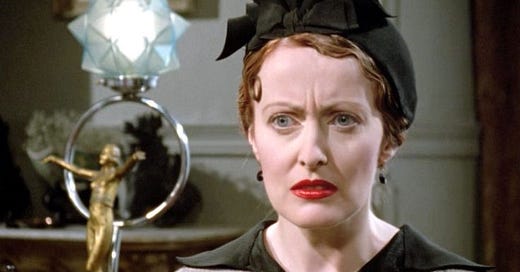




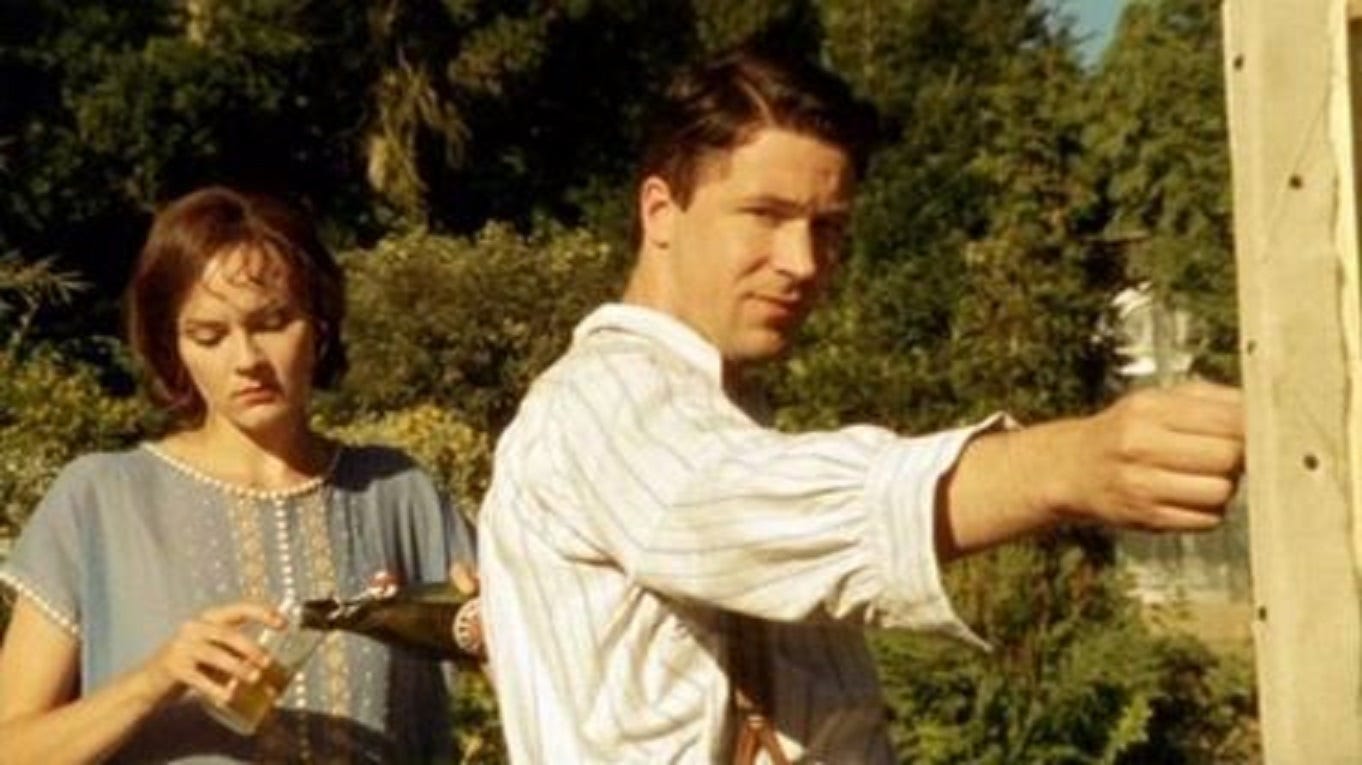
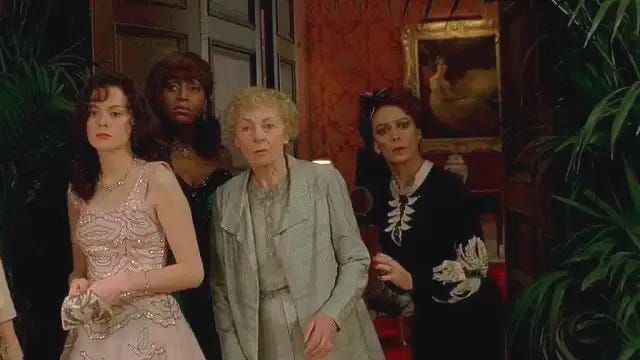

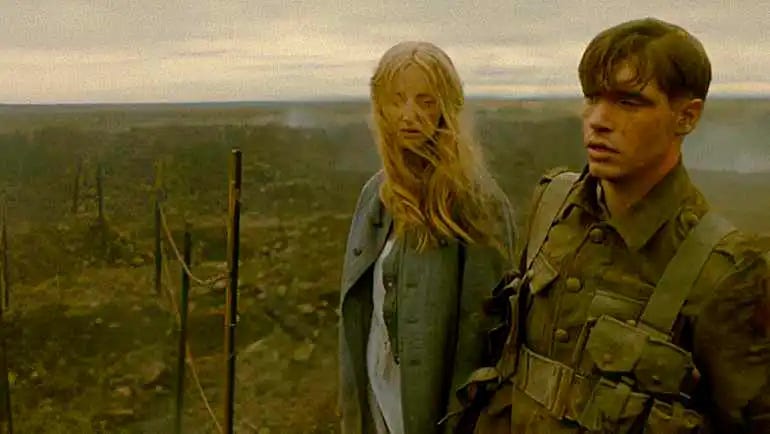
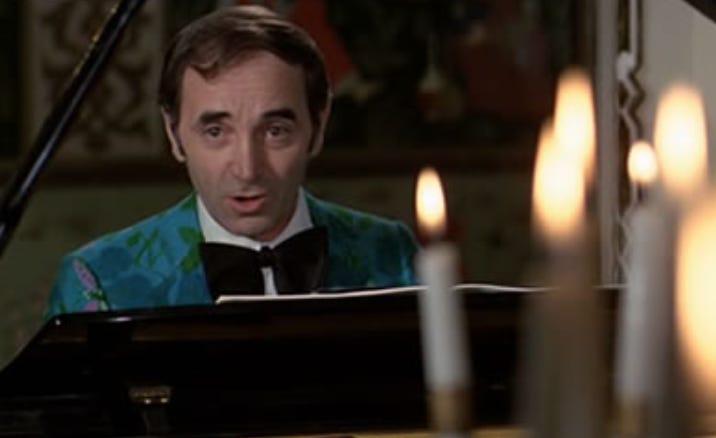

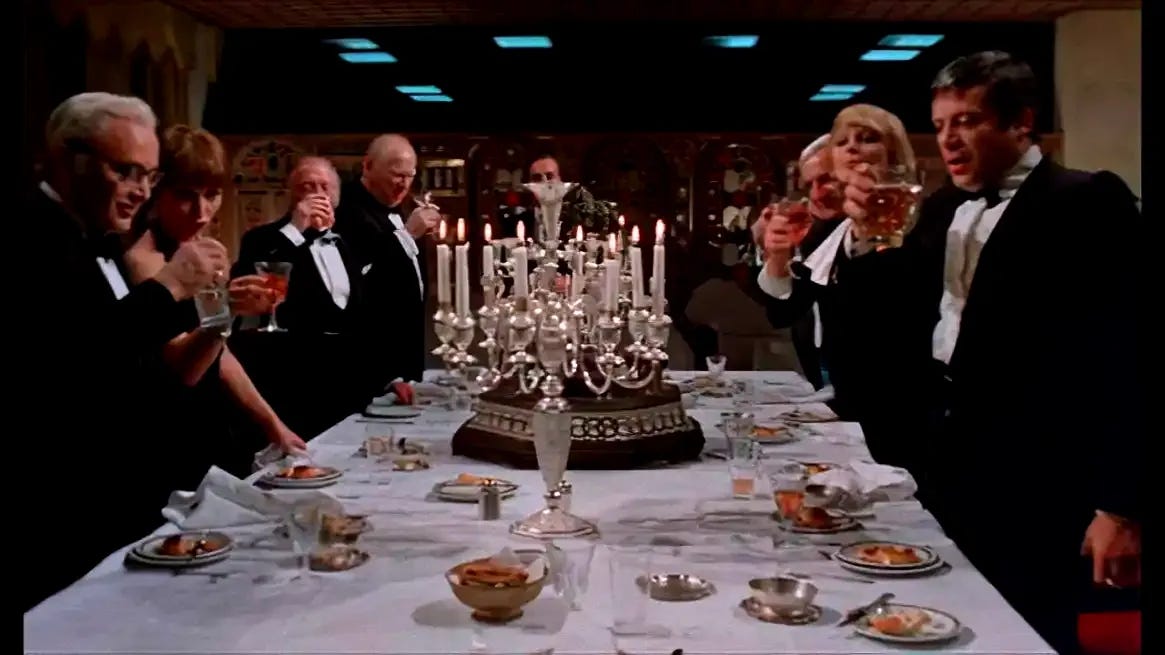
Dear Laura,
A fantastic finale! Definitely worth the wait ( ok it was only one night but you know what I mean 😂). I was surprised to find that I too didn’t mind (too much) that A Haunting in Venice was about as similar to Hallowe’en Party as I am to a super model. I’m a bit of an old Goth at heart and so enjoyed Venetian decor and I really want that zoetrope with the skeleton reel. However….
I knew you would have the adaptation of ‘Five Little Pigs’ in your list - we have discussed this before and while I still toy with asking you for your second and ‘handbags at dawn’, have to admit that you are completely correct in your evaluation. I think I was seduced by the 1920 costumes and the Erik Sate piano music. Toby Stephens would have indeed made a marvellous ‘Augustus John’ type of artist (excuse me while I fan myself). Rachel Stirling is gorgeous, much more so than the woman who played Elsa Greer (no offence) but I think that this works because it explains why Amyas stayed with his wife despite his frequent dalliances. Mind you when you think how fabulous R.S and T.S would have looked as a sexy feisty couple it was indeed a lost opportunity.
The terrible 1980s films, I’d need a couple of glasses of wine before I could really laugh at them.
The ‘Agatha Christie’s Marple’ series, after the initial ‘Murder at the Vicarage’ (beautiful costumes…) were toe curling, throw a cushion at the television awful. My most hated was the ‘Nemesis’ program- what the 🤬?!??!
I completely agree with your assessment of the Sarah Phelps programs but have to add my own proviso that Sarah Phelps be force fed her own scripts for stating with a spiteful superiority that she had never read Agatha Christie. I wouldn’t even allow her salt and pepper, I’m still that cross.
Apologies, I appear to have turned into a proper keyboard warrior 🙈😂❤️
I managed a full five minutes of David Walliams as Tommy, and gave up. How reassuring to discover that I’m in good company.